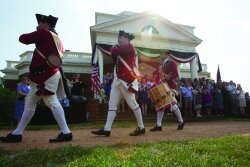Reborn in the USA
By Cathy Harding
Recently The Atlantic published a quiz, “Are You Smart Enough to Be A Citizen?” It’s a jumble of multiple-choice questions about iconic American architecture, Supreme Court justices, and historical documents. I had high marks, attaining citizenship “with distinction,” according to the magazine’s editors. The questions weren’t all that hard.
Click-bait gimmicks aside, it’s easy to be cynical about U.S. citizenship. Against a backdrop of robots killing Muslim children and Big Brother joining forces with Verizon, even the occasional banner week (looking at you, Wendy Davis) barely dents my dismay about the state we’re in.
Clearly, I’ve been away from Monticello for too long.
I lived in Charlottesville for 17 years. And for most of that time, I attended the July 4 naturalization ceremony on the Little Mountain. Because I was working at a local newspaper, some years I brought a notebook with me. Other years I brought my sons or a friend.
I always brought Kleenex.
Indeed, my shell is not so hard that the patriotism and emotion of Monticello’s swearing-in ceremony won’t melt it. More than the bunting and flags and the groomed lawn spreading out in front of the magnificent house (though there is high beauty in the scene), it’s the new citizens’ stories. They attach themselves to timeless ideals: liberty, consent of the governed, unalienable human rights. Monticello on July 4 stands for the triumph of optimism over experience.
Yes, democracy is an imperfect idea, not unlike Jefferson himself who was a hot mess of excellence and cruelty. Generations later, another statesman would observe that democracy is the worst form of government except for all the others. The new citizens reciting the oath at Monticello in many cases have lived through the rotten alternatives. To them, the United States remains a beacon of hope. It embodies the promise of new beginnings. Seeing this country through immigrants’ eyes, nestled in the cradle of democracy without commercial endorsement on a day that marks the rebel start of it all… my heart swells just thinking of it. And don’t get me started about the municipal band— a Wilderesque touch of Americana that would be easy to sentimentalize except for the fact that if you’re local, you probably know half the musicians.
But it’s the stories— the stories— that really get the waterworks and wonderment flowing. Over the years, I’ve heard rousing tales from famous naturalized citizens and others who come to Monticello to exhort the new Americans to scale the heights of possibility. There was Madeline Albright, who spoke of her tears upon seeing Lady Liberty, realizing that she and her Czech family were safe from the Nazis. Little did Albright know when pulling into New York Harbor that she’d some day have TJ’s old job. There was Sam Waterston, who praised the new citizens as “fresh troops and reinforcements.” “We old citizens could use some help,” he observed, wisely. There were the artists Christo and Jeanne-Claude, who said something about their website. Tracy Ullman gave the nod to Carol Burnett, Lucille Ball, and other great American comics who freed her spirit. George W. Bush, without trace of irony, praised freedom of speech. Dave Matthews, onetime Charlottesvillian by way of South Africa, may indulge his trademark scatology when he speaks later this week, but I'm certain the millionaire bandleader and philanthropist will also mention opportunity.
Those stories inspire, yet it’s my friend Irena’s that forever defines the naturalization ceremony for me. Living in Eastern Europe before the Wall fell, she flew to the U.S. to visit her husband, who was situated here temporarily on a research visa. She packed a small bag for herself and their 7-year-old son, telling no one, not even her in-laws, of her plan to stay in the country. Well into her third trimester with their younger child, she knew the risk she was taking. If the authorities realized her physical condition, they’d turn her back at the gate. She put on the chunkiest sweater she could find and held her breath. When the plane finally made it into West German airspace, she told her boy they had just left home for good. Nearly a decade later, we watched and cried while she and her husband pledged their allegiance at Monticello. One year later, their older son became a U.S. citizen, too.
I am moved by Irena’s courage and her faith that the United States won’t let her down. This country might confound her, as it does all citizens from time to time, but, she believes, it won’t irredeemably betray its ideals. Her willingness to bet all her chips on this grand experiment is the true measure of citizenship. Irena and the other new Americans I’ve seen on the Fourth of July at Monticello genuinely pass the test with distinction.
~
Cathy Harding lives in New York City.

2 comments
Yea I tear up at naturalization ceremonies as well. Take today to think what you could do to make the country a better place.
Happy Fourth!
Good to see Ms. Harding's words back in the local press. Nice writing, as always.